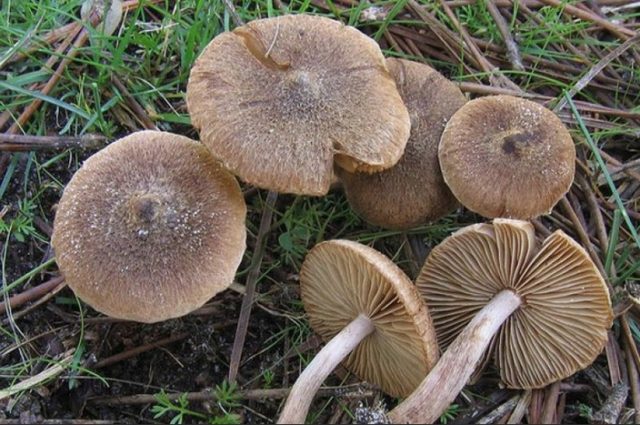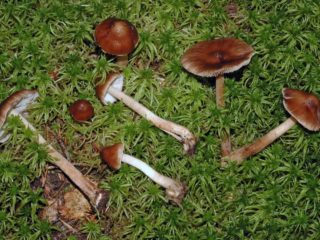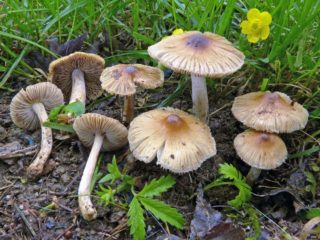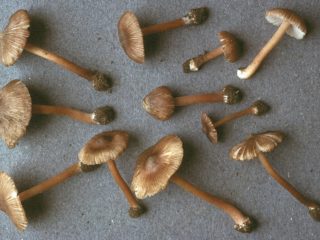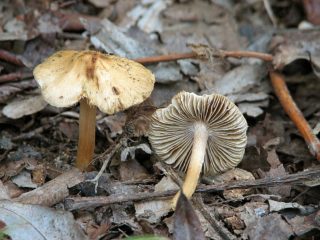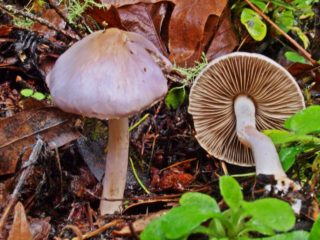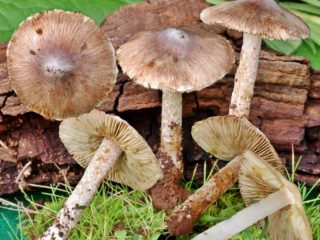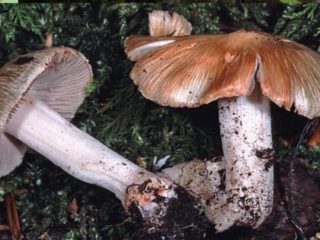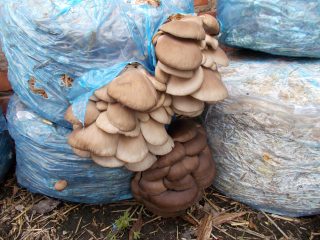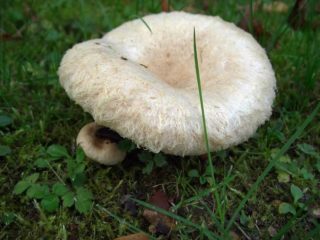Content
Torn fiber (Inocybe lacera) is a poisonous representative that mushroom pickers should not be put in their basket. It grows in the mushroom season, when there are many honey mushrooms, russula, champignons. It is important to distinguish fiber from other lamellar mushrooms that are conditionally edible, otherwise urgent medical attention will be required.
What does a torn fiber box look like?
The torn fiber is small in size. Her hat is a bell with a tubercle in the middle. It is colored light brown, sometimes with a yellow tint, and has a diameter of 1 to 5 cm. With age, the surface of the mushroom darkens, acquiring a brown color, the cap cracks along the edges. A thin cover in the form of a cobweb sometimes hangs from the fiber.
The stem of the mushroom can be either straight or curved, light brown with reddish scales. Its length does not usually exceed 8 cm, and its thickness is 1 cm. Wide brownish plates are spliced with the stem. Spores are orange-brown. The flesh inside is yellowish-white at the cap and reddish at the stem.
Where the torn fiber grows
Broken fiber grows in damp coniferous and deciduous forests, willow and alder thickets. It can be found on the side of forest paths and ditches. She prefers sandy soils and shady secluded spots where good edible mushrooms grow.
Fibers are found both in numerous groups and singly. The fruiting season lasts from July to September.
Is it possible to eat a torn fiber
The mushroom has a mild odor and bitter taste, which at first feels sweet, but not worth eating. Torn fiber is poisonous, its use leads to death, if you do not provide assistance to the victim in time. The mushroom pulp contains a dangerous poison - muscarine in a concentration that is ten times higher than that of a red fly agaric.
The toxicity of the mushroom is not reduced as a result of heat treatment. Toxins are preserved after cooking, drying, freezing. One torn fiber, caught in the mushroom harvest, can ruin all preservation or dishes for the everyday table.
Poisoning symptoms
Inexperienced mushroom pickers can confuse fiberglass with honey agarics; cases of poisoning with these mushrooms have been described. It gets very bad after about 20 minutes. after eating the fiber torn for food. A severe headache begins, blood pressure rises, limbs tremble, the skin turns red.
Muscarin, which is found in mushrooms, causes saliva and sweat, severe cramps in the stomach, intestines and other organs. There is a sharp pain in the abdominal cavity, vomiting and diarrhea. The heart rate slows down, the pupils are greatly narrowed, and visual impairment occurs. With a large amount of poison, cardiac arrest occurs.
First aid for poisoning
At the first symptoms of poisoning, you must call an ambulance.Before the arrival of doctors, they try to provoke vomiting in the victim and give an enema to remove the contents of the stomach and intestines. Fortunately, there is an antidote for muscarine - this is atropine, but doctors will inject it. Before the ambulance arrives, you can use any sorbent - activated carbon, Filtrum or Smecta.
In the hospital, where the victim will be taken, his stomach will be washed with a tube. If symptoms consistent with muscarine poisoning develop, atropine will be injected subcutaneously as an antidote. They will make a dropper to improve the general condition.
If the dose of toxins is small and first aid in case of poisoning was provided on time, the prognosis of treatment is favorable. The use of inedible mushrooms by children is especially dangerous. They need a much lower dose of muscarine to stop their heart than adults, and help may not come in time.
Conclusion
Torn fiber is a dangerous representative that should not be confused with honey agarics, champignons and other lamellar mushrooms. It contains the deadly poison muscarine, which causes vomiting and diarrhea, severe stomach pain, and cardiac arrest. The victim needs immediate help, since the poison begins to act within 20-25 minutes after eating the torn fiber.
